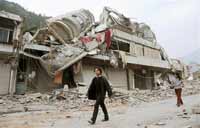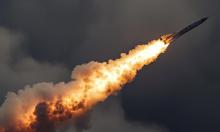Chinese earthquake with 10,000 victims to affect economy
The earthquake that devastated parts of central China's Sichuan province will likely have a limited impact on the country's booming economy, analysts said Tuesday, though repercussions were seen across the region.

Authorities reported about 10,000 dead from the quake, which destroyed schools, factories and other buildings in the hilly but industrialized region of small cities and towns.
State-run television reports showed mountain roads blocked by huge boulders unleashed by landslides. Cell phone and other telecommunications services were reported out of service across much of the region. Some airports were closed.
To minimize disruptions to financial markets, China's two stock exchanges suspended trading Tuesday in 66 companies based in the region. But share prices fell anyway, with the benchmark Shanghai Composite Index down 2.3 percent in afternoon trade, at 3,542.1.
China's economic planning agency ordered industries to ensure supplies of power, coal and medicine to areas hit by the quake. The Commerce Ministry called for companies to provide emergency shipments of instant noodles, cell phones and other needed equipment.
Two chemical plants collapsed in Shifang city just north of Sichuan's capital, Chengdu, the official Xinhua News Agency reported, burying hundreds of people and spilling more than 80 tons of toxic liquid ammonia.
About 600 people were killed, although Xinhua did not say whether they died in the quake or from the chemical spill.
Toyota Motor Corp. suspended production at its factory in Chengdu to inspect the plant for safety problems, company spokesman Toshiaki Hori said Tuesday in Tokyo.
Details on other specific damage or shutdowns were still scarce, investment bank Merrill Lynch said in a research note forecasting that the impact on the broader economy would be smaller than that of the severe snowstorms that paralyzed much of south-central China in January and early February.
That disaster snarled transportation, knocked out power grids and forced a halt to aluminum smelting and other production in many parts of the country. Damage from the quake may be severe but it is limited to one region.
Sichuan is one of China's most heavily populated provinces, and although it is far inland, past policies promoting industrialization away from coastal areas mean the region does have many factories.
However, Sichuan and the adjacent industrial center of Chongqing account for only about 3.5 percent of the country's total manufacturing and a minuscule 1 percent of total exports, according to Mingchun Sun, a Lehman Brothers economist.
China's steaming economy cooled only slightly in the first quarter despite the storms and global gloom, expanding by 10.6 percent in January-March from a year earlier. That compared with expansion of 11.2 percent in the previous quarter.
Yet, China is struggling to contain inflation that remains near decade-high levels, and the earthquake could increase those pressures,
Sichuan produces about 9 percent of China's total rice harvest, and given recent worries over shortages and surging prices, the disaster could fuel panic buying that would drive prices higher, Sun wrote in a report released Tuesday.
While many in China were just beginning to tally the damage from the quake, others were already reckoning on the potential opportunities from the knowledge that every disaster brings a period of reconstruction.
In Tokyo, shares in bulldozer and other heavy equipment makers rose on expectations of higher demand due to the cleanup and rebuilding from the quake.
Subscribe to Pravda.Ru Telegram channel, Facebook, RSS!





